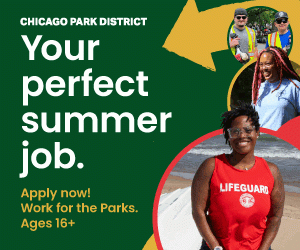When Chicagoans go to the polls, they’ll be voting on a new position in Chicago’s government — the Police District Council. This new position will have broad implications for police policy and allow a community voice in policing for the first time.
New Form of Municipal Government Adds a Community Voice to Police Affairs
When Chicagoans go to the polls this February, they won’t just be voting on their respective alderperson and mayor but a new Police District Council — which will aim to add a community voice to policing throughout the city.
Loyola’s Lake Shore Campus is located entirely within the 24th Police District, which covers the entirety of Rogers Park and parts of Edgewater and West Ridge.
In each of Chicago’s 25 police districts, there will be a three-person District Police Council elected by voters to serve as liaisons between police and community members within the district, according to a 2021 Chicago police reform ordinance. The councils will meet once a month and work to select a second city-wide police oversight body known as the Community Commission for Public Safety and Accountability, according to the ordinance.
Larry Dean is the organizing and policy associate for the Community Renewal Society, one of several groups who worked to get the ordinance passed. Dean said the initiative first started in 2018 with two groups, the Chicago Alliance Against Racist and Political Repression (CAARPR) and the Grassroots Alliance for Police Accountability (GAPA). Both worked on separate proposals for more public control over the police department.
“GAPA wanted a collaborative process where it was half community members and then half selected by the mayor in order to have kind of the same power to hire and fire officers, elect a superintendent and recommend police policies,” Dean said. “So they were kind of fighting the same battle just in different ways.”
CAARPR wanted to implement a system similar to an elected school board where community members representing all police districts could have many of the same powers as what GAPA, according to Dean.
Dean said the two groups later combined their proposals and formed a coalition with several other groups, including the Community Renewal Society, to get the current ordinance passed in July 2021. The structure in place is a compromise by having elected Police District Council members nominate commissioners of the city-wide commission with the final approval by the mayor’s office, according to Dean.
Under the new system, the commission has authority over city-wide public safety issues. The commission is able to recommend department-wide policies, influence key police leadership positions and set department-wide police goals, according to Dean. The members of the commission are nominated by a committee with a council member from each of the Police District Councils.
“The commision kind of works as a middleman between the mayor’s office and district councils, which represent the community,” Dean said.
In addition to selecting who will be nominated to the commission, Dean said the primary role of the Police District Councils is to connect the police to the community.
The district councils will work with the Police District Commander to implement community policing initiatives, work together to propose initiatives to the commission, identify trends in policing and assist the community in public safety matters, according to the ordinance.
The 24th District has six candidates running for the Police District Council.
The Phoenix spoke with four of those candidates about what their vision for the council is and what they hope to accomplish if elected.
Veronica Arreola, an educator and community organizer from West Ridge, is running alongside two other candidates — EdVetté W. Jones and Rev. Dr. Marilyn Pagán-Banks — as a part of Unite the 24th, a slate of three long time community organizers running for 24th Police District Council.
Arreola talked about her goals for the position.
“My goal is to get the councils to be known and trusted in the community so that people can come to us with their ideas and concerns,” Arreaola said. “We’re not being elected to implement our own personal ideas on police accountability. We’re being elected to bring the community’s ideas on policing accountability to the police.”
Similar ideas were expressed by candidate David Williams III. He is a Navy veteran who has lived in Edgewater for the last 10 years and currently works in medical logistics.
Williams said he hopes the District Council will be able to bring down police brutality and get community members involved in public safety.
He also suggested specific policy changes such as ending the use of taxpayer dollars to pay for misconduct settlements, changing police schedules to give officers more time for mental health and strengthening residency rule so that officers have to live in the district they work in and not just the city.
“If you’re a police officer that works in the district, you should actually live there to build better rapport with the community where that also builds trust as well,” Williams said.
Another candidate, Daniell Wolk, said one of his ideas is to have crime statistics easier to read for community members.
Similar ideas were expressed by candidate Cynthia McFadden, a longtime Chicago advocate from Rogers Park who said she would wants to have police retrain on civil rights every six months and work to understand their rights.
McFadden said it brings her joy to be able to run for the new office and help contribute to police reform efforts.
A common thread among the candidates was the challenge in communicating to voters about the council. .
“I’ve had probably a few hundred discussions by now with voters who say ‘oh what’s this all about,’ and I’ve tried to explain it to them,” Wolk said. “For me, the main obstacle is just getting the word out. People are not inclined to read government website pages, where the council’s explained.”
Williams said, when canvassing for signatures, he’s had to educate voters on what the position is.
“You inform them that instead of working for the mayor or some politician, these people literally in the community are going to be your boss,” Williams said. “Their voices need to be heard and that’s why they got to come out and vote.”
McFadden said when she collects signatures, she makes sure to inform voters about the new position and answer any questions they have.
Dean also spoke about the challenge in getting the word out about the district councils.
“This is so new that people don’t know what it is,” Dean said. “So we’ve worked a lot to create awareness around, ‘What actually is the District Council? Who’s running? Why should I care about this?’”
Dean said he hopes that in the next election every district will have a competitive race and the public will be more invested in their communities.
“We shouldn’t need a campaign to tell people what these positions are, we should know,” Dean said. “There should be enough reporting, there should be interest and there should be a larger group of people who want to be candidates.”
Featured image courtesy of Aidan Cahill











